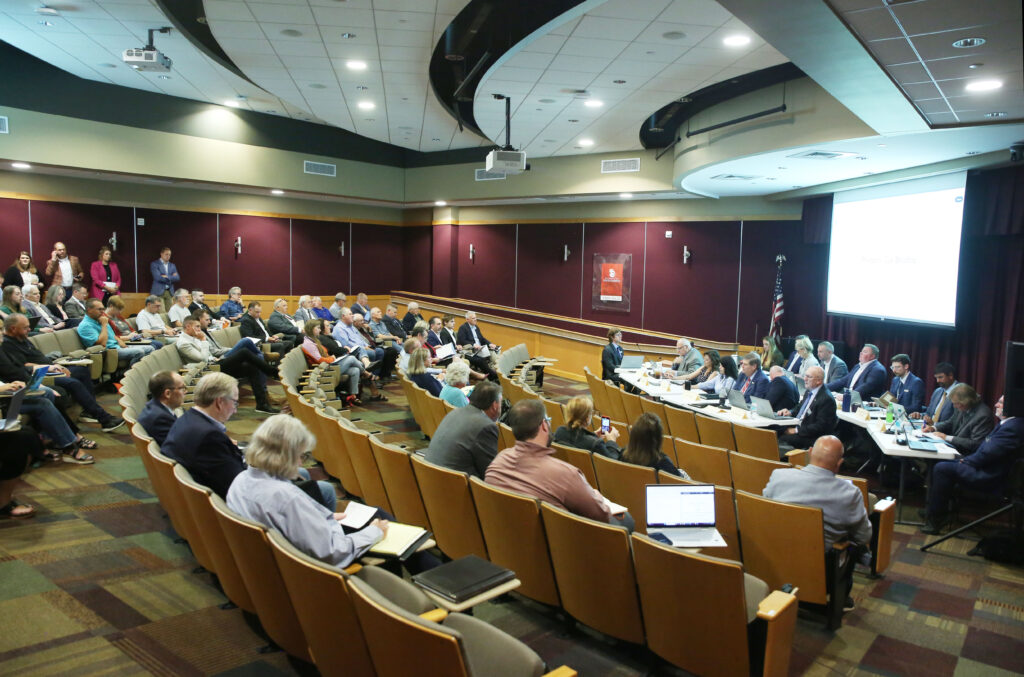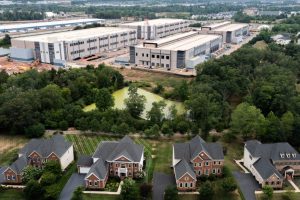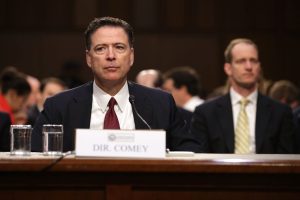Members of the Comprehensive Property Tax Task Force meet in Sioux Falls on June 25, 2025. (Makenzie Huber/South Dakota Searchlight)
During the last legislative session, lawmakers passed Gov. Larry Rhoden’s bill designed to help homeowners get relief from the high cost of paying property taxes. Don’t expect that to be the last word on the subject.
Dramatic increases in property taxes have given rise to some strident calls for change. Owner-occupied dwellings, in particular, have seen their property tax bills increase. While the Legislature is certainly listening to those complaints, as yet it is still struggling to find relief for property owners who say they are seeing the ability to keep living in their homes slipping away.
The property tax problems in South Dakota were neatly summed up during an educational panel at Dakotafest, as noted in a story in the Mitchell Republic. South Dakota Retailers Executive Director Nathan Sanderson said that when the subject is property tax relief, the state has three choices: shift the burden to another class of property, ask schools and counties to spend less, or find another funding source.
None of those solutions have many backers, though finding another funding source is part of the solution offered by Rhoden. He has proposed allowing counties to voluntarily impose a sales tax of up to half a percent with the funds to be used for relief of residential property taxes. This is a stopgap measure at best and sure to have its detractors in the Republican-controlled Legislature, because it calls for a new tax.
From property to purchases: Task force considering fundamental tax shift to reduce homeowner burden
Rhoden already has one property tax win, with the passage of a complex law designed to offer homeowners some relief. The new law, which took effect July 1, limits the increase in owner-occupied residential assessments to 3% countywide for five years; sets a five-year, 3% cap on the amount taxing districts and school capital outlay budgets can increase as a result of new construction; exempts some home improvements worth less than 40% of a home’s value from affecting assessments; and expands eligibility among disabled and elderly people for property tax assessment freeze programs, including an increase in the multi-person household income limit from $45,000 to $65,000, and an increase in the maximum value of an eligible home from $300,000 to $500,000.
While that legislation has many moving parts, it represents only a portion of a tax system that lawmakers were admonished to study by another Dakotafest panel member. Former state senator Mary Duvall said lawmakers should do their homework, learning about the state’s tax system so they know what they’re talking about and have the expertise to assess the impact of their legislation.
The need for expertise in how the system works can be seen in a proposed constitutional amendment offered by former legislator Julie Frye-Mueller, among others. That amendment has not yet been approved for circulation to gather signatures.
If approved by voters, the amendment would scrap property taxes and instead levy a $1.50 fee on transactions of $15 or more and a 10% fee on purchases of less than $15. These fees would be charged over and above the sales taxes that are already on the books.
The Legislative Research Council, which has to review all proposed constitutional amendments, said its passage would change everything as it relates to the funding of counties and schools. Passage of the amendment would also rely on the Legislature to design a way to collect the tax, establish a distribution formula and manage a new property tax replacement fund.
Those blank spots in the amendment will certainly ask voters to take plenty on faith if they were to vote for the new system. The next step in the process of approving the amendment for circulation is creating a fiscal impact statement which will show if the new tax, at a buck-and-a-half a purchase, could actually generate enough money to keep schools and counties afloat.
The proposed amendment shows the folly of trying to fix the state’s tax system in a piecemeal fashion. Like the 18 property tax bills in the 2025 legislative session or the dozens that will likely show up in 2026, they only go to show that there’s no one solution to revamping the system.
As Sanderson pointed out at Dakotafest, the Legislature has been “schizophrenic” lately when it comes to taxes, cutting the sales tax and considering elimination of the sales tax on groceries. Lawmakers do this, all the while proposing legislation that’s supposed to “fix” property taxes, often without including a way to replace the funding.
According to Sanderson, the Legislature has conducted summer studies of property taxes three times in the last five years. With summer winding down, let’s hope that this year’s Comprehensive Property Tax Task Force can decide on a way forward that makes sense for the state.
That may be a lot to hope for since past summer studies apparently haven’t alleviated the pressure felt by the state’s property taxpayers. The scope of these studies is too narrow. It would be best for the state to widen the study and take on all taxes, rather than just property taxes. A comprehensive study is needed because it’s obvious that a change in property taxes is likely to have ramifications for the state’s entire tax system.
Our latest commentary, delivered to you: Sign up for our free newsletter.





